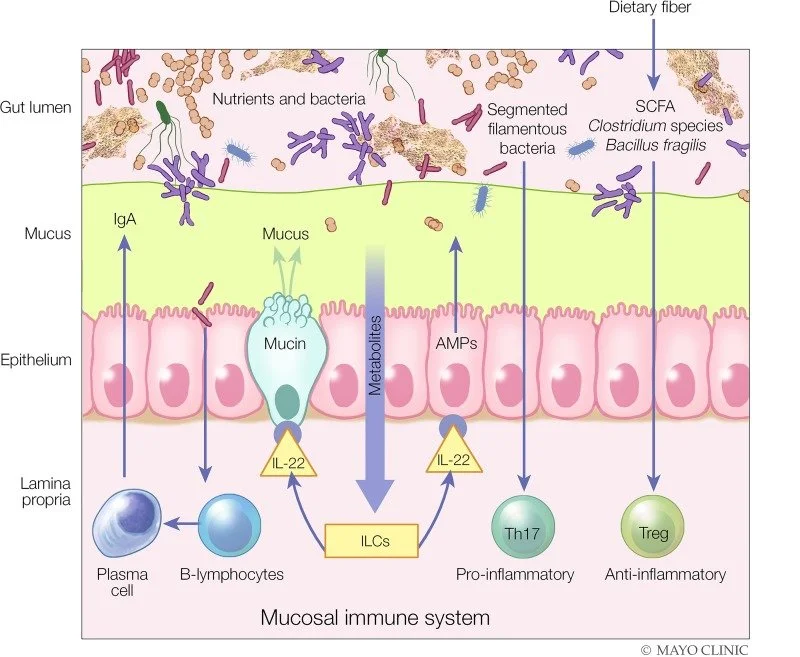Some home truths on “leaky gut” (and why it’s time to expand the conversation beyond gluten)
About 8 years ago I delivered a presentation on "leaky gut" and how gluten was the prime dietary culprit when it came to digestive insults. Fast forward 8 years and my perspective has definitely evolved...
Let's start with the first point of contention, which lies with the name itself.
Given the gut is a dynamic structure that is opening and closing all the time (and the intestinal barrier is actually by design semi-permeable), every single one of us will have a level of "leakiness" (or in more technical terms, "permeability").
Normal intestinal permeability is defined as “a stable permeability found in healthy individuals with no signs of intoxication, inflammation or impaired intestinal functions”. A healthy gut barrier selectively enables absorption of water and essential nutrients, while protecting against adverse health effects from ingested or internally produced toxins (1, 2).
Impaired intestinal permeability is defined as “a disturbed permeability being non-transiently changed compared to the normal permeability leading to a loss of intestinal homeostasis, functional impairments and disease” (1).
So, it is only when permeability/ leakiness is impaired that problems can arise, and of course it's the degree of impairment that will determine how this plays out for someone's health.
Let's take a step back and have a look at what makes up the all-important "gut barrier".
The barrier consists of MUCH MORE than just a single cell thick wall (as is often stated/ perceived!). It’s complex, dynamic and multilayered.
Although a single layer of epithelial cells forms the main physical barrier between the opening inside the bowels/gut and mucosal tissues (held together by tight junctions), there is ALSO an incredible mucousal barrier, the all-important microbiota which forms a microbial barrier, a vascular barrier and a sophisticated chemical barrier. Motility and immune functions also contribute to the function of the barrier (1, 3).
All layers of the barrier are important and all can be damaged or supported in different ways. We're still learning about the intricacies of all of this because as you can see, there are quite a few pieces of the puzzle to put together!
Is a dysfunctional gut barrier really that problematic?
It can absolutely be, yes! There’s a mountain of papers published on impaired intestinal permeability and its relationship with immune dysregulation, chronic inflammation (meta-inflammation) and many chronic diseases (1, 4). One thing is abundantly clear, improving the integrity of the gut barrier (in all it's multi-layered glory!) is absolutely fundamental to overall health and should be an ongoing focus for all of us.
It's time to think about the causes holistically.
Although gluten gets the lion’s share of attention, there are many drivers of impaired barrier function. After all, anything that damages the gut microbiota, mucousal lining, vascular lining, epithelial cells and/or depletes key digestive health nutrients can negatively impact on the gut barrier.
Below are some of the known causes of increased “leakiness” and gut barrier dysfunction(1,2,3,4,5,6,7,8).
Gluten*
The classic “western diet” which is low in fibre, low in polyphenols, nutrient-poor, high in processed foods, high in hydrogenated fats, high in added sugar, high in artificial sweeteners and emulsifiers.
Excessive and chronic alcohol intake
Elevated HbA1C levels/ hyperglycaemia
Nutrient deficiencies (i.e. Vit A, Vit D, Zinc)
Many medications (i.e. NSAIDs, antibiotics, and those which cause depletion of key gut nutrients like vitamin A and zinc/ depletions of beneficial microbes/ depletion of intestinal mucous)
Smoking
Environmental toxicants (i.e. glyphosate, plastics, heavy metals)
Chronic stress
Obesity
The aging process
Strenuous/ excessive/ endurance exercise
Pregnancy
Gastrointestinal infections/ pathogens (via disruption to the microbiome)
Inflammatory intestinal diseases (i.e. Crohn’s disease, Coeliac disease)
Circadian/ body clock disruption
Some of these result in short-term/transient “leakiness” of the gut (i.e. exercise), some of these are part of normal physiology (i.e. pregnancy), some cause more permanent and significant dysregulation for the gut barrier (i.e. inflammatory digestive diseases).
We are also born with an incredibly immature gut that is exceptionally leaky, which is why babies can't eat solids immediately. It takes several years for their digestive systems to mature and match the sophistication and complexity of an adults. This is one of the reasons introducing solids too early, as I discuss in detail here, can be highly problematic.
The intention of sharing the above list is not so you throw your hands up in the air and say “Well, I’m doomed then, everything negatively impacts my gut!”.
The intention is to get you thinking about the bigger picture.
*A word on Gluten
While it's true that gluten triggers the release of zonulin, a protein which acts like a key to open the tight junctions (8), in those with good gut integrity and no adverse reaction to gluten, these doors close again in a matter of minutes! In other words, the impact is only very transient in most people, and there is generally no problems for people with a healthy immunological response. In people with coeliac disease however, there is a much higher level of zonulin release and the tight junction doors can get stuck open. This allows for much more time for other potentially damaging substances (that otherwise wouldn’t) to enter the body, perpetuating immune dysregulation and inflammation.
Importantly, zonulin release isn't just triggered by gluten, it's also released by the presence certain bacteria in the small intestine. Interestingly, this is believed to be a protective response (9), and as we're learning waging wars on our microbiota by wiping them out entirely can be a very dangerous game. Again, it's important to zoom out and take a big picture view of things.
Impaired intestinal permeability is not the end of the diagnostic story, it is part of it.
The causes and solutions are multilayered, just like the gut itself.

